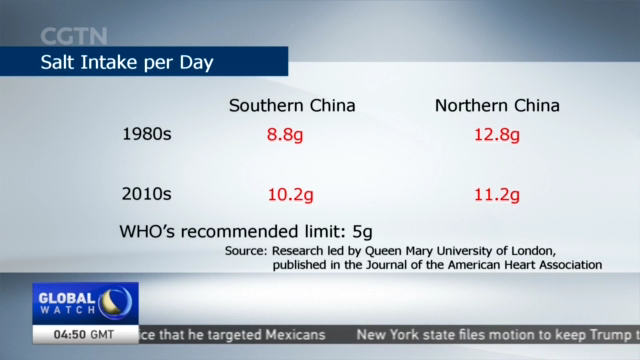
13:13, 10-Aug-2019
Salt Intake: Chinese salt consumption consistently double recommended level
Updated
13:51, 10-Aug-2019

A recent study led by Queen Mary University in London has shown that the salt intake in China is among the highest in the world. So how concerning is this phenomenon? Our reporter Wei Lynn Tang has more from the southwestern city of Chengdu.
Zhao Yaohua and his wife are a working couple, but despite the time constraints of their jobs, they cook and eat at home as much as they can.
The main reason is they want to avoid the oily, salty fare on offer in the city's restaurants.
ZHAO YAOHUA APPLICATION ENGINEER "Since we had a child, we started being more aware both of his health and our own. We only have one child. If our health isn't good, it will be a burden to him when he grows up."
So, the awareness is there. But Zhao and his wife don't measure the amount of salt used in their cooking. It all comes down to their taste buds. And this is where it gets tricky.
Zhao's seemingly blander preference may not actually bring them into line with the World Health Organization's guidelines on salt intake.
WEI LYNN TANG CHENGDU "The WHO recommends that adults take a maximum of 5 grams of salt a day, which equals 2-thousand milligrams of sodium. That's essentially ONE teaspoon of salt. By cooking at home, you may 'technically' control your salt intake, somewhat. But for those who eat out a lot? How do you know exactly how much salt you are consuming every day?"
Experts say much of the sodium that we take in comes from packaged foods - snacks from street markets, fast-food chains.
A Double Cheeseburger, for example, has a-thousand milligrams of sodium – just less than half of the daily limit.
The increased consumption of processed food and eating out is a key reason why salt intake in southern China is rising.
A different phenomenon is seen in northern China, where salt consumption has dropped, according to a new study led by Queen Mary University of London. But all the same: the country's salt intake remains well above the recommended limit.
This is making doctors edgy.
WANG WENYAN, CHIEF PHYSICIAN INTERNAL MEDICINE DEPT., SICHUAN PROVINCIAL PEOPLE'S HOSPITAL "The prevalence of salt-related cardiovascular diseases like hypertension is increasing in China dramatically. And we know hypertension is the beginning of many cardiovascular diseases including stroke, heart failure, coronary heart diseases."
Official statistics show some 245 million people, or almost a quarter of the Chinese adult population, has hypertension.
That's dramatically up from 2002, when this number stood at 153 million, or 18 percent of Chinese adults.
And Doctor Wang's concerns do not end here.
WANG WENYAN, CHIEF PHYSICIAN INTERNAL MEDICINE DEPT., SICHUAN PROVINCIAL PEOPLE'S HOSPITAL "In my clinical work, the youngest hypertension patient is only 15 years old and the blood pressure level is very high. We do some genetic test, endoscopy screening, we cannot find anything – the only reason is because they consume more salt, or they have some unhealthy behaviour."
Given China's history of flavorful dishes and need for salt in its cuisine, Doctor Wang says it would be more realistic to bring down the country's salt intake to maybe 8 grams a day - rather than the recommended 5 grams.
It may be a long-run game to bring down China's historically high salt intake, but one that would prove remarkable if achieved. WLT, CGTN, Chengdu.
SITEMAP
Copyright © 2018 CGTN. Beijing ICP prepared NO.16065310-3
Copyright © 2018 CGTN. Beijing ICP prepared NO.16065310-3